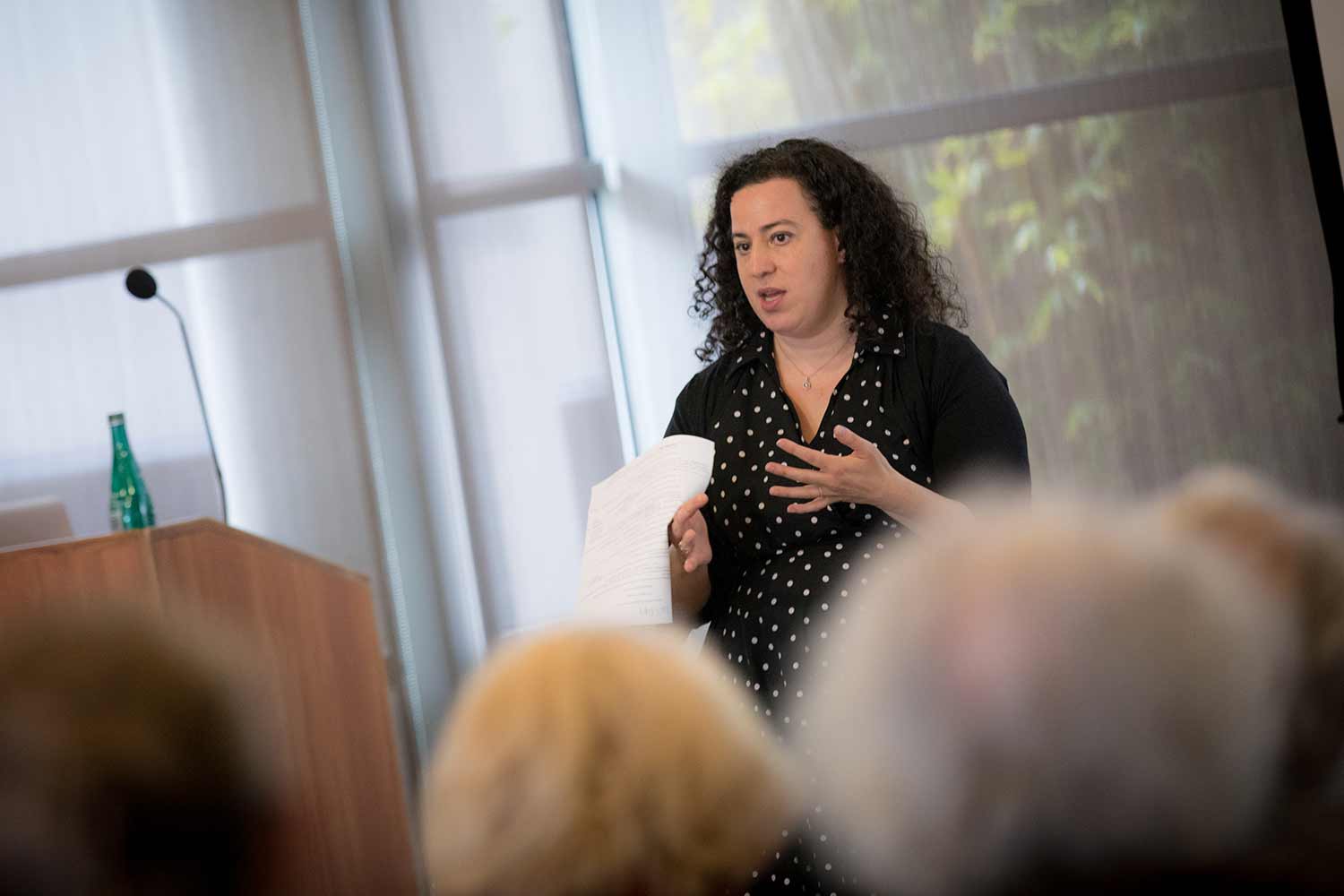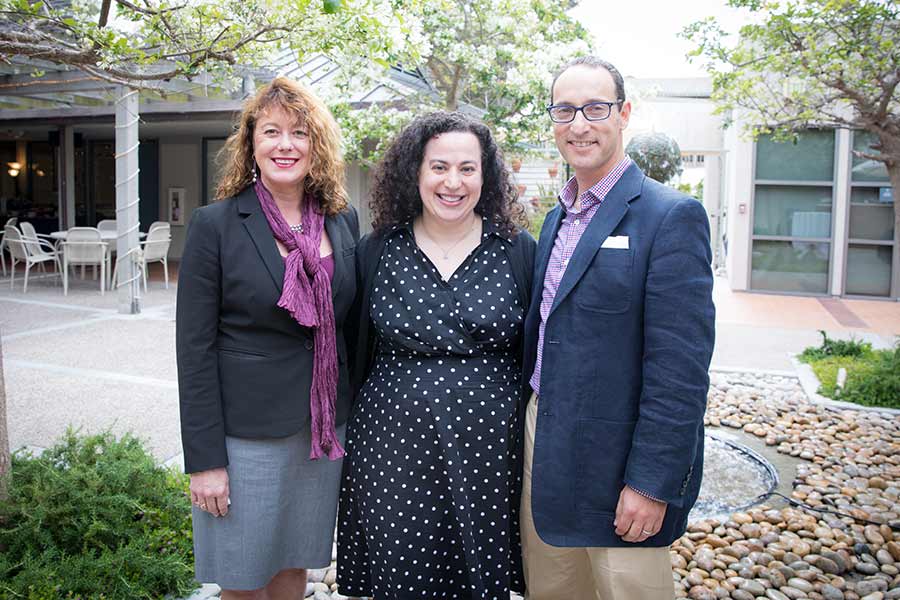By:
- Anthony King
Published Date
By:
- Anthony King
Share This:

Princeton University professor Elizabeth Harman at the UC San Diego Faculty Club May 24, 2018. Photos by Farshid Bazmandegan
#MeToo and the Failure to Warn Others
Ethics in the Public Sphere distinguished lecture series brings timely discussion to the forefront
Before the May 25 arrest of Harvey Weinstein, more than 80 women came forward with allegations of sexual assault and abuse, including actors Rose McGowan, Annabella Sciorra, Salma Hayak and Uma Thurman. In a February interview, Thurman said she had complicated feelings about Weinstein because of how bad she felt about those attacked after her. But what duties do survivors of sexual assault have to warn others?
In the latest Ethics in the Public Sphere discussion from the UC San Diego Department of Philosophy, Elizabeth Harman argued that survivors do, in fact, have an obligation to warn others, and sexual assault “wrongs” victims by imposing these obligations on them. Survivors are put into moral relationships with future victims that are unhealthy, burdensome and, as Thurman said, complicated.
“Sexual harassment and sexual assault often wrong their victims in an underappreciated way: they turn their victims into wrongdoers. By failing to warn others, victims wrong them,” Harman outlined in her talk “#MeToo and the Failure to Warn Others” at the Ida and Cecil Green Faculty Club on May 24, the day before Weinstein was arrested on charges of rape and sexual abuse. Harman is Laurance S. Rockefeller Professor of Philosophy and Human Values at Princeton University.

From left, Division of Arts and Humanities dean Cristina Della Coletta, Elizabeth Harman and Department of Philosophy chair Jonathan Cohen.
“There is so much at stake for future victims, it is certainly worth trying to protect them,” she said. “Failing to report is usually not justified.”
Harman uses a simple background assumption to show that victims do have an obligation to come forward: A third party who witnesses sexual assault, sexual harassment or intimate-partner violence is required to say something, she said. “If someone literally sees something happen, they are morally required to report it even if bad things might happen to them—and they are blameworthy if they fail to report it.”
In discussing her argument, Harman identified several “bad reasons” to think there is no wrongdoing when there is a failure to report. Believing that the actions are the responsibility of the perpetrator alone, or believing that the incident was isolated are two examples.
“Another important factor is that reporting may be ineffective,” she said, recognizing how difficult it can be for those who do come forward, from inadequacy in the formal reporting process to having no effect whatsoever on behavior.
“One of the questions I want us to think about today is ‘What duties are there for victims to warn others that might even go beyond engaging in formal reporting processes, if those processes don’t lead to proper warning of potential future victims?’” she said. “Are victims obligated to do more?”
Even though it is wrong to not come forward, Harman said, there are several reasons why victims themselves remain blameless if they do fail to report. These ranged from, again, the ineffective and difficult reporting process and backlash received against warning others, to not correctly conceptualizing what happened and being traumatized. Victims, including Thurman, shouldn’t feel guilt, but rather what Harman said philosophers call “agent-regret,” or the recognition of having been the agent of something terrible while not being to blame.
“My most important claim is that being turned into wrongdoers is a real, distinct injury to victims,” she said.
Exploring ethical challenges facing contemporary society, the Department of Philosophy brings relevant and timely topics to the forefront for greater understanding and discussion through their distinguished lecture series, Ethics in the Public Sphere. Established in 2012, the series is a forum to bring to light the discussions and debates where ethics and public life intersect.
“The series is an opportunity for philosophy to engage the campus, the community and the world, on issues of broad concern where ethics intersects public life,” said Jonathan Cohen, professor of philosophy and department chair. “These are not just issues for the cloistered seminar room, but for everyone. Professor Harman’s talk was a beautiful demonstration of the distinctive contributions philosophy can make to society.”
Previous talks include a historical and political look at the Paris Climate Agreement, the ethics of neuroimaging, sustaining democracy around the world and ethics in war. In 2013, a panel was assembled to discuss the true aims of education, looking at education standards and human values, charter school and justice, and molding conscientious students.
“Just as UC San Diego is one of the world’s leading universities of scientific innovation, it is also where we, as humanists in the Division of Arts and Humanities, present the foundation for a deeper understanding,” said Cristina Della Coletta, dean of the division. “And while we take great responsibility in training our students to understand and help solve these important societal issues, we recognize they are not meant to only be explored in the classroom, but rather discussed openly with the greater community in which we live. These problems, and these solutions, belong to everyone.”
Share This:
You May Also Like
Stay in the Know
Keep up with all the latest from UC San Diego. Subscribe to the newsletter today.



